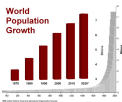 VigilanceVoice
VigilanceVoice

www.VigilanceVoice.com
Wednesday.. January 16, 2002—Ground
Zero Plus 127
THE
FUTURE OF MANKIND AND THE WORLD--
"A PERSPECTIVE FROM HELENA, MONTANA"
by
Cliff McKenzie
Editor, New York City Combat Correspondent News
Irony makes the world a more interesting
place to live.
It twists the “normal” into the “abby-normal,” as Gene Wilder
so deftly put it in Mel Brooks’ beautifully ironic “Young Frankenstein.”
Montana is one of the few states in America where the
population doesn’t grow, or if it does, it moves like a glacier. The
leader of de-evolution of population is Wyoming. The irony of sitting in a
state where beauty and resources abound in plenty, is knowing that the
rest of the world has another idea in mind than remaining stable,
consistent, “normal.”
As I rose this morning and walked out into the chilly Montana
morning and looked up into the gauzy sky suggesting the possibility of
snow, and sucked in clean air brushed down to my lips from the strong,
defiant ribs of the Rocky Mountains surrounding the Helena Valley—I
thought back over thirty years ago to a symposium my wife and I had taken
in San Diego, California at the University of California San Diego campus.
The title was—The Future Of Man.
It was held over a six month period. World famous speakers
from a variety of fields including education, military, industry, finance,
philosophy, headlined the roster. Three Nobel Prize winners offered
their viewpoints over the course of the symposium, and, the hook was at
the end, this most prestigious platform of the world’s most forward
thinkers would spell out a map of the future, and give us their bottom
line of what to expect as time’s clock ticked.
I was free lancing at the time, writing articles for magazines
and news syndicates. Having a leading edge on the future seemed to me a
vital part of my job. Also, I was shifting my attention toward becoming
the world’s greatest undersea reporter, and had made inroads to align
myself with some of the most fascinating research relating to who owned
the resources under the ocean, and how the military-industrial complex
viewed maintaining and holding rights under the sea.
I became closely acquainted with Professor Richard Dill, one
of the best minds in the world when it came to exploring the powers under
the ocean. He was also a key design input force for the DSRV-1, the first
deep sea rescue vehicle designed to extract people trapped in nuclear
submarines buried deep in the ocean floors where no others could go.
We, Americans, had just landed people on the moon and space
exploration was peaking. Tied to the budgets for space pioneering was
funding for oceanography research. As long as the public’s eyes were awed
with outer space, “inner space,” the bottom of the sea, was also
protected: they were symbiotic fellows.
The Symposium was not well attended. We
sat in an amphitheater at UC San Diego and could throw spitballs if we
wanted at the greatest minds in the world. Political correctness and the
women’s movement had not yet gained the power of the club, so therefore no
lines of protestors stood outside the doors jeering that the “Future Of
Man” was a sexist name that marginalized gays, lesbians and all women,
past, present and future. Neither was there an army of lawyers waiting
to file lawsuits for emotional distress caused by the world’s leaders
excluding women from speaker agenda, or disenfranchising them from the
future of the world. Quite frankly, at the time, no one cared, for
everyone knew the Future Of Man was dependent upon the Future Of Women.
Dr. Edward Teller, the key force behind the atomic bomb, and
other Nobel winners drew maps and sine waves showing how we were going to
blow ourselves up and how we were dissolving nuclear resources into
military rather than industrial might.
One of the key anti-government proponents cited President
Eisenhower’s unfulfilled plan to conscript every citizen into government
service for two years to reduce the size of federal government; and an
education specialist told how the most important teachers of children
should be non-teachers, average citizens without educationally twisted
backgrounds who cared more for the children than structured learning
outlines, and they should be allowed to teach for no more than five years
and then retired to bring vigor and excitement into the first years of a
child’s education.
Of course, each speaker presented mountains of facts to
support his prediction of what the future needed to add or subtract for
the world to prosper.
On the final day of the symposium, all the prior speakers
gathered for a panel—a consensus among the great minds laying out the path
for the Future Of Man. I looked forward to the sparks that might fly as
the world’s greatest intellectual egos all attempted to agree on one
common platform for the future. I was sure such an end-point would be
impossible.
I couldn’t have been more wrong, or more shocked by their
summary.
My pen was poised; my ears cocked waiting to hear the secret
to the future. When it was extolled, man-by-man,
intellectual-by-intellectual, I sat stunned, but pragmatically aware they
were right.
In a non-intellectual nutshell, they said the future of man
was that half the world would become “slaves” to the technological “other
half.” Their consensus was the world could not support equal advancement
among nations. That in the end, the world would be split between the
halves and have-nots. The masters and servants. The strong and the
weak.
It came down to supply and demand and resources to support a
world of advanced technology. On the military-industrial side, it was
deemed impossible to provide technology to underdeveloped nations who
would more than probably misuse them because they hadn’t “earned the
right” to own them.
One by one, they summarized the world as though it were a
piece of cake cut in two—one side rich and prosperous, the other feral and
fetid. Their population curves, economic forecasts, and technological
projections demanded that only one side of the coin could afford the
luxuries of modern civilization without depleting the resources of the
earth, and the other half must serve to supply them as the labor, the
grunts of the earth.
To a bleeding heart liberal, such talk was heresy. It rubbed
raw against the “do unto your neighbors as you would have them do unto
you.” It smacked of Hitlarian principles of “Deutschland Uber
Alles!”
But, if you looked at the numbers, studied the facts, used your common
sense, the nagging question of “how the entire world could all live on the
pinhead of technological advance” was unresolved. There was much more
demand than supply of resources to achieve such a goal.
The great minds stopped short of how to “enslave” half the
world. They didn’t go into how to build the Great Wall Of Technology to
keep the have-nots from crossing the moat into Paradise. It was science
fiction at its best—yet the men who summarized this incredible map of the
future were the most revered thinkers and doers of our time—hailed by the
world for their contributions to mankind and womankind.
Over the past thirty years I’ve kept those thoughts secreted
in my mind. They aren’t casual conversation pieces. There was something
deadly accurate about the facts they presented, but something more deadly
wrong about the ethics of smothering nations and peoples so that they
could serve those who had, and suppressing their right to acquire what
Thomas Paine so deftly noted in his 'The Rights Of Man'.
Terrorism has changed my ideas of keeping my thoughts to
myself, and, in an ironic way, validated what the great minds of the
Future Of Man Symposium stated three decades ago.
The Taliban seeks to halve the world. It’s great goal is to
cleave itself from Westernization, to deny its citizens the right to
technology, to suppress the formation of a McDonald’s on every corner of
every dusty road in every middle eastern country.
Osama bin Laden could have been one of the speakers at the
symposium. His solution was to extricate the “other half” from
technology.
As I have studied the thinking of those from a part of the
world that lives without the luxuries we term “civilized,” I find more and
more advocates denouncing that what we call “normal advancement” to be
“abby-normal” by their standards.
I’ve always been skeptical that Osama bin Laden is anything
more than a figurehead of beliefs rising out of the Middle East. Men
like Juma Namangani, legendary head of the Islamic Movement of Uzbekistan
(I.M.U.)—the Che Guevara of Muslims in Central Asia, seek a pan-Islamic
state across Central Asia. His advanced guards, reports Ahmed Rashid in
the Jan. 14 issue of The New Yorker, “are beautiful female snipers armed
with the latest scopes and night-vision goggles, and that the guerrillas’
knapsacks are filled with dollar bills that they distribute to the farmers
who feed them.” He goes on to say that Muslim holy men make the
guerrillas’ bodies impervious to wounds and their bodies sweet-smelling
after death.
The irony of the Future Of Man Symposium is not that the
technological world will enslave the non-technological world, but vice
versa. Today, Terrorism threatens to blow up the fragility of modern
advancement.
Its first step was the World Trade Center.
The “uncivilized” washed the world of “technology and power”
into a world of fear. The edifices of greatness that have been built by
years of evolution of technology now are crumbling. When the most
primitive people on the earth from an economic and technological point of
view can make the most advanced people shudder in fear, the tables have
turned. The “haves” have become the “have-nots” as of 8:46a.m.,
September 11.
Many will argue this point. But, the mere fact that Americas
military might is still trying to find and kill one man after four months
of throwing an entire nation’s resources at him, proves one simple
point—cockroaches will survive after all the other creatures have died.
In the evolution of mankind, we forget that perhaps our way of
life as the “haves” of the world may not be the only or best way to
survive the future. Perhaps, in the long run of human evolution, the
lack of technology will provide those who live in “abby-normal” ways to
our tastes, fortitudes of survival we can only imagine.
Montana is like that. While it does not race to build its
power and might, it sits upon the greatest resource in the world—water.
It is the watershed for the United States. Should it stop the flow of
water, it could cripple an entire nation.
Maybe, like the Taliban, or the I.M.U., Montana isn’t so
“backward” after all. Maybe it’s sitting on top of the world—and maybe
it’s a “have” not a “have-not” state.

Go
To Jan. 15--GOVERNOR OF MONTANA ACCEPTS VIGILANCE ARMBAND




